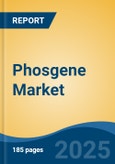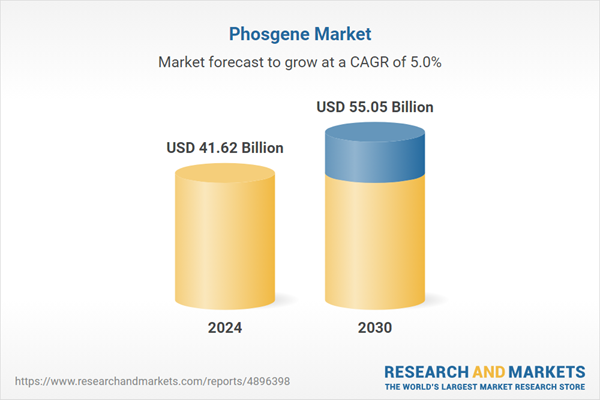Speak directly to the analyst to clarify any post sales queries you may have.
10% Free customizationThis report comes with 10% free customization, enabling you to add data that meets your specific business needs.
Key Market Drivers
Growing Demand of Phosgene in Pharmaceutical Industry
The global pharmaceutical sector has grown substantially, with revenues reaching approximately USD 1.6 trillion in 2023 - comparable to the GDP of major global economies. Phosgene plays a crucial role in the synthesis of fine chemicals used to manufacture pharmaceutical products. Its reactivity and precision make it indispensable for producing high-performance, targeted drug compounds. As healthcare demands increase globally, particularly with an aging population and growing chronic disease prevalence, the need for pharmaceutical products continues to surge, directly fueling the demand for phosgene as a chemical intermediate in drug manufacturing.Key Market Challenges
Risks Associated with Safety and Handling
Handling phosgene presents significant safety risks due to its high toxicity and corrosive nature. Exposure can lead to severe respiratory distress, skin and eye irritation, and other acute health effects. As a result, companies must invest heavily in protective measures, rigorous employee training, and advanced infrastructure to ensure safe storage and use. These investments increase operational complexity and cost. Moreover, transporting phosgene safely requires specialized logistics solutions, further adding to the expense and limiting scalability. The industry is also subject to strict global regulatory standards aimed at safeguarding human health and the environment, which adds administrative and financial burdens for market participants.Key Market Trends
Shift Towards Green Chemistry
Sustainability initiatives are driving the adoption of green chemistry principles in the phosgene market. This approach focuses on developing safer, more environmentally responsible chemical processes that reduce or eliminate hazardous substances. In phosgene production, this trend is reflected in research into alternative synthesis routes - such as carbonylation methods - that lower environmental risks and enhance safety. These advancements align with growing industry and regulatory emphasis on sustainable practices, aiming to reduce toxicity and improve efficiency across applications where phosgene is utilized. The integration of green chemistry is transforming traditional processes, paving the way for more sustainable and compliant manufacturing operations.Key Market Players
- BASF SE
- The Dow Chemical Company
- COVESTRO A.G.
- VANDEMARK CHEMICAL INC.
- Vertellus Holdings LLC
- SYNTHESIA, A.S.
- ATUL LTD
- HODOGAYA CHEMICAL CO., LTD.
- UPL LIMITED
- SHANDONG TIANAN CHEMICALS CO., LTD
Report Scope:
In this report, the Global Phosgene Market has been segmented into the following categories, in addition to the industry trends which have also been detailed below:Phosgene Market, By Derivative:
- Isocyanates
- Chloroformates
- Carbamoyl Chloride
- Others
Phosgene Market, By Application:
- Agrochemicals
- Pharmaceuticals
- Polycarbonates
- Dyes
- Fine Chemicals
- Others
Phosgene Market, By Region:
- North America
- United States
- Canada
- Mexico
- Europe
- France
- United Kingdom
- Italy
- Germany
- Spain
- Asia Pacific
- China
- India
- Japan
- Australia
- South Korea
- South America
- Brazil
- Argentina
- Colombia
- Middle East & Africa
- South Africa
- Saudi Arabia
- UAE
Competitive Landscape
Company Profiles: Detailed analysis of the major companies present in the Global Phosgene Market.Available Customizations:
With the given market data, the publisher offers customizations according to a company's specific needs. The following customization options are available for the report.Company Information
- Detailed analysis and profiling of additional market players (up to five).
This product will be delivered within 1-3 business days.
Table of Contents
Companies Mentioned
- BASF SE
- The Dow Chemical Company
- COVESTRO A.G.
- VANDEMARK CHEMICAL INC.
- Vertellus Holdings LLC
- SYNTHESIA, A.S.
- ATUL LTD
- HODOGAYA CHEMICAL CO., LTD.
- UPL LIMITED
- SHANDONG TIANAN CHEMICALS CO., LTD
Table Information
| Report Attribute | Details |
|---|---|
| No. of Pages | 185 |
| Published | June 2025 |
| Forecast Period | 2024 - 2030 |
| Estimated Market Value ( USD | $ 41.62 Billion |
| Forecasted Market Value ( USD | $ 55.05 Billion |
| Compound Annual Growth Rate | 4.9% |
| Regions Covered | Global |
| No. of Companies Mentioned | 10 |









